- Home
- Belva Plain
Heartwood Page 9
Heartwood Read online
Page 9
“It’s okay, Robby. It’s okay,” she soothed. Her initial panic was subsiding and now she could think again.
“It’s not okay. I wouldn’t blame you if you were furious at me … I wouldn’t blame you if you left me.”
“I would never do that.” If I walked out on my marriage, that would break my mother’s heart. I want to keep as much of this from my parents as I can.
But there were other members of her family. Members who would be glad to hear that Robby had given up on his dream of a PhD … And they would want to do whatever they could …
On the other end of the phone, Robby had pulled himself together. “I’m sorry,” he said, “I shouldn’t have let myself … I shouldn’t have done that. It was just … thinking about going back there … to Blair’s Falls … I worked so hard to get out of that dump … and I swore I’d never go back …”
“We’re not going there, I promise.” Laura’s mind was racing now. Steve had political connections all over the eastern seaboard because of the pro bono work he did, and Phil knew everyone in the financial community on Wall Street. Jimmy and Janet had a wide circle of influential friends. Surely one of her brothers could help Robby get another teaching job. A job here. Somewhere in the New York City area.
“Robby, I have to go now, I have to make a few phone calls. But don’t worry, because we’re going to be okay.”
By the time she boarded the plane for California the next day, all three of the Stern brothers were already putting out the word that their sister wanted to move back home and their brother-in-law was looking for a job on the East Coast.
Next year I’ll show Katie the snow, Laura thought as the plane lifted up into the sky.
Chapter Eleven
It was Steve who came up with a job for Robby. “Not teaching,” he said to Laura when he called her with the news. “If Robby wants to do that again, he’s going to have to ask Professor Hawkins for a recommendation and it doesn’t sound as if the man would give him one.” Laura hadn’t told any of her brothers the extent of the disaster her husband had created in California, but they did know that Robby and his mentor had had a falling out. “Besides,” Steve went on, “I think it might be better for Robby to be out of an academic environment for a while.” He was being diplomatic. Clearly, Laura’s brothers had decided to handle her carefully. “There’s a little museum in the Hudson River Valley, about an hour’s drive north of Manhattan. It’s called the Barker Museum and it’s dedicated to the culture of the Native American tribes that lived in the area before the Europeans came—the Mohawks, the Mahopacs and the Mohegans, mostly. A couple of years ago I did some work for the place, and the guy who owns it liked me. His name is Leland Barker; he’s extremely wealthy, his hobby is archaeology, and he’s managed to put together a nice collection of artifacts. Leland built the museum, he’s the chief source of funds and for years he’s acted as curator—it’s really a one-man show, but he’s in his eighties now and he realizes he needs someone to take over.”
“And you suggested Robby.”
There was a pause on the other end of the line. She pictured Steve searching for the right words. “I’m going to be honest with you,” he finally said. “Robby is overqualified for this job. But he’s got an opportunity to build something there. Leland is well connected, he’s got money and influential friends he’s willing to call on. And he feels that this museum is his legacy. If Robby can find ways to expand it, and establish it as a more serious institution, Leland will back him all the way. Robby can make this job whatever he wants it to be.”
If it were one of her brothers facing that challenge, the sky would be the limit. But Robby wasn’t one of Theo Stern’s sons. Still, it was a job. And it was in the Northeast.
“Steve, I don’t know what to say except thank you.”
“You may not thank me so much when you hear what kind of money your husband will be making. The Barker Museum operates on a shoestring …”
But Laura had already decided that this time Robby wouldn’t be supporting the family all by himself. It was much too risky. She had another plan in mind.
“I just want Robby to be doing work he likes.”
She repeated that to Robby when they sat at the kitchen table that evening, and she told him about the position.
“I don’t give a damn what kind of work it is,” he said. “I just want to get as far away from this town and Custis University as we can.”
So Laura called Steve and told him Robby wanted the job. Then she emptied her rainy day fund, and with that as a down payment—she was going to buy this time, not rent—she flew east to find a home for her family. She wanted to stay in Westchester, within commuting distance from the city. “How about a co-op or a condominium?” the real estate agent suggested. “That would be within your price range.”
But what she needed for her plan was a house. And it only took her a couple of weeks to find what she wanted. She and Iris were driving into Manhattan—Laura was staying with her parents—when they’d stopped for gas and she’d spotted the perfect place.
“Actually, you can still get some bargains in that area,” the real estate agent said when she told him about it later. “There were many lovely old homes there that were turned into multiple dwellings during the fifties and the sixties. People are just starting to buy them and restore them.” Then he’d checked the information on the house Laura had mentioned. “That property is a real fixer-upper. To be honest with you, it’s been on the market for over a year because no one wants to take it on. Are you sure you wouldn’t like to see something that won’t require as much work?”
Laura was sure.
–—
Up close, the house was even more perfect than she’d thought it would be when she’d seen it from the road. It sat on the top of a hill, at the end of a long, badly maintained gravel driveway. On either side of the driveway the branches of ancient trees bent to touch one another; in the summer they would form a green leafy canopy overhead. Behind the trees were shrubs in need of pruning, and formal flower beds, which were overgrown—she would have to wait until spring to see just how bad the damage was. Phlox would grow beautifully in these gardens. So would peonies, roses, lilies and fresh herbs. Laura was going to need fresh herbs.
Inside, there was more good news; although the house had been badly neglected the bones of it were fine. The plumbing and the wiring had been kept up to code, according to the real estate agent, and the roof was relatively new. Most of the problems were cosmetic: stained and peeling wallpaper, woodwork that would have to be stripped and parquet floors that were badly in need of refinishing. But the crown moldings and the wainscoting were original and magnificent, and even though someone had replaced the old chandeliers and sconces with ugly modern fixtures, the originals had been packed up and stored in what had been the old ballroom.
“What a fabulous room!” Laura said as she walked through it. “And it opens out onto that terrace and the back lawn. Perfect for a summer party.”
But it was the kitchen that was her main concern. She held her breath as the real estate agent opened the big wooden door with the glass transom in the top. Then she breathed a sigh of relief. “Look at all the counter space!” she cried. “And that huge old sink! Of course, I’ll have to get new appliances and the cabinets will have to be refinished, but that old tile floor is gorgeous, and it would be easy to clean. And there’s plenty of room for a big worktable in the center.” She turned to the real estate agent. “It’s exactly what I need,” she said.
Now it was time to put her plan into action.
–—
She went to the library in her parents’ neighborhood—what would she do without libraries?—and read up on small businesses. She worked out the cost of the repairs and restoration she’d need to do. Based on the work she’d done on the house in California, she was sure her figures were accurate. Then she asked the real estate agent for the keys to the old house because she wanted to show it to someone, and
she spent the next two days shopping for food and cooking. When she was finished, she called her brother Phil and the next evening they drove to her dream house.
“I’m so glad you could come with me, Phil,” she said as they finally stopped jolting their way up the driveway.
Her brother was staring up at her treasure. “When you said you wanted to treat me to a picnic at sunset, I didn’t know you were planning to take me to the House of Usher.”
“It’s not that bad.”
“Really?”
“What you’re seeing are surface problems; underneath, this place is a real prize.”
“If you say so.”
“I just want you to promise to keep an open mind.”
They unloaded the hamper of food she’d prepared and she led the way inside the house. She’d chosen to have her picnic in the old ballroom, where the last rays of sunshine were streaming through the long windows, so she spread a checkered table-cloth on the floor in there and set out cutlery and china.
“You’ve been so mysterious about all of this,” Phil said. “I assume we’re not trespassing …”
“No. The person who gave me the key to this place knows we’re here.” She opened a thermos and poured steaming soup into bright red mugs. It was a concoction of her own—rich, chock-full of mushrooms, and it filled the air with the scents of the red wine and rosemary she’d used. She sliced a loaf of crusty bread she’d baked that morning and arranged slices of an onion tart—also her own recipe—on a platter.
“Are you going to explain what’s going on?” Phil demanded.
“Just try my soup, then I’ll tell you.” He took a spoonful. “Is it good?”
“Of course. It’s delicious. Now, will you please—”
“I’m glad you like it. Because I think it’s going to be one of the signature dishes for my new catering business.”
“Are you serious?”
“I have this idea.” Actually, she’d had it for quite a while, but she’d believed it was impossible. Now that she was finally talking about it, she found herself tripping over her own words in her excitement. “Most people hire a caterer for big formal events, that’s the way it was out in California. But I think the women in this community might want something more casual. They’re working at jobs outside the home now, many of them are commuting into the city. They don’t have time to throw together a little dinner party for friends or pack up a picnic basket when the family goes to the beach. Stay-at-home wives used to do that kind of thing all the time; modern women are too busy.
“But people still want to entertain, and be social. They want life to be graceful and warm, it’s just that no one is around to do the work. So I’ll be there. If you want to have a romantic dinner for two for you and your husband, I’ll deliver it on your doorstep, complete with wine and flowers from my garden. If you want to have a simple at-home wedding, I can provide the meal, and even make the table linens so they’ll be color-coordinated with your bridesmaids’ dresses. Your wedding cake will be unique because it’ll be homemade.” Excited now, she stood up and turned around, gesturing to the four walls of the ballroom. “And someday, after I’ve fixed it up, I’ll be able to offer you this room with the beautiful nineteenth-century crown moldings if you need to accommodate two hundred guests.” She turned to her brother and asked breathlessly, “What do you think?”
“It’s obvious that you’ve been thinking about this for a while.”
“Ever since I first started working for the caterer in California.”
“How can I help?”
“I want to buy this house, and set up my catering business here. Robby and Katie and I will live here too. I have some money I’ve put aside from my baking, and it’s enough for a down payment. But I’m going to need capital to get this place in shape, and to start the catering company. I have a business plan, Phil.” She pulled it out of the picnic hamper and handed it to him. “If you look it over, you’ll see that I’m projecting a profit after six months. I can do that because my overhead will be so small. I know you work with venture capitalists, and …” she drew in a sharp breath “… and I’m going to need investors, so if there’s anyone you could talk to …”
“You have your investor.”
“I don’t understand.”
“Me. I’m going to be your investor.”
“I didn’t mean … I wasn’t asking you …”
“My money’s on you, Laura. I figure I’ll make a fortune off you. Because if you want this, I know you’ll make it … What are you doing … Laura, you don’t cry at a business meeting! Come on … you’re getting my shirtfront wet!”
Later that night, as she lay in bed, too excited to sleep, she thought, This is a real new beginning for Robby and me. This time it will be different. He’ll be happy working at the museum—it’s a perfect job for him with his charm and love of people—and he won’t even remember California and Hawkins.
And I’ll have my business. Phil thinks I can make a go of it. And so do I. It’ll be fun. Yes, this is a new beginning. My family believes in them. That’s the spirit that brought them to this country. It got them through wars and tragedies. I come from tough stock.
The thought was incredibly comforting.
JOURNEY
Begin doing what you want to do now.
We are not living in eternity.
We have only this moment, sparkling
like a star in our hand and
melting like a snowflake.
MARIE BEYON RAY
Chapter Twelve
“Mom, you’re not listening!” Katie stopped in the middle of the sidewalk, forcing Laura to stop too. “I was talking to you,” Katie scolded. “And you ignored me. That’s rude!” At the age of twelve Katie had strong beliefs about what was and was not acceptable behavior, and rudeness topped her list of the unacceptable. It was a code she had picked up from her grandmother. Iris would have cut off an arm before she ignored something that was said to her, and Katie adored Iris.
It had been that way from the beginning. When Katie, Robby and Laura had moved east three years ago, Laura had hoped her daughter would grow close to both Theo and Iris, and Katie did love them very much. But there was something special between Katie and Iris. Robby and Theo had both seen it when Katie was still a baby in her crib, and now most of Katie’s conversations were peppered with the phrase, “Grandma says.”
Laura looked at the small figure standing in front of her. I’m a throwback to my grandmother and Katie is a throwback to hers. But Katie is stronger than Mom, I see that already. And it’s as it should be. The new generation stands on the shoulders of the old—that’s how it is in families.
But now her daughter was standing in the middle of the sidewalk on Madison Avenue and frowning at her.
“I’m sorry. You’re quite right,” Laura said. “I was thinking about something else, and I was rude to you. Forgive me?”
Katie considered it carefully. “Yes, I will,” she said finally. Harmony restored, she and Laura began to walk together again. “Grandma Iris says you’re always rushing,” she told Laura. “I think she’s afraid that Daddy doesn’t like it when you’re not home for dinner and things … well, he doesn’t … but I explained to Grandma that Daddy doesn’t like to work and you do.”
“Katie, that’s not fair. Your dad goes to his job every day.”
“But he doesn’t like doing it. And he doesn’t understand why you like yours so much.”
She was so smart. “What did Grandma Iris say when you told her all of this?”
“Just that I must always respect my father. And I do, Mom.”
“Of course you do. And you know, maybe I do rush around a little too much.”
“Maybe. But you won’t stop.”
My child knows me.
The truth was, Laura loved being busy because after three short years her catering company was booming, and she still couldn’t get over it. It had taken months to do the necessary renovations on the hous
e, so she’d stayed in New York to work on it, while Katie and Robby finished out the school year in California. By the time they’d come east with Molly, Laura had been halfway through the project. She’d fixed and decorated Katie’s room first, before anything else. Then she’d concentrated on the areas she would need for her business. For six weeks she and a couple of workmen had worked on the kitchen and fitted it out with the professional equipment the law required her to have if she was going to prepare and sell food to the public. She’d planted her gardens full of the herbs she would need in her cooking and the flowers she would use to make the bouquets that would accompany the freshly prepared family dinners and food baskets she’d be delivering to clients. She’d painted the kitchen, the pantry, the laundry room and the back entrance where she kept her gardening tools, a cheery yellow, and she’d run up blue and white curtains for the windows. The hideous wallpaper in the dining room and the living room was stripped off, and the walls were painted a warm and inviting taupe. The old chandeliers and sconces were back where they belonged and the bay windows were swagged with creamy draperies made from a bolt of silk she’d purchased at a discount on the Lower East Side in the city. She’d set up a corner of the living room as her office, where she could man her phones and take orders. Then she’d opened her doors for business and the rest of the renovations had been on hold. The ballroom remained unfinished, as did all the bedrooms except Katie’s. Robby complained regularly about the peeling paint and crumbling plaster in theirs, but somehow Laura never seemed to get around to fixing it up. Later, she would realize that it was significant that the room that was the heart of a good marriage had not been a priority for her, and she would want to weep for Robby and herself. But at the time she just told herself she’d get around to it when she didn’t have something more important to do.

 The Golden Cup
The Golden Cup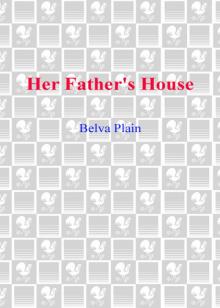 Her Father's House
Her Father's House Whispers
Whispers Crescent City
Crescent City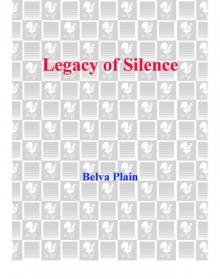 Legacy of Silence
Legacy of Silence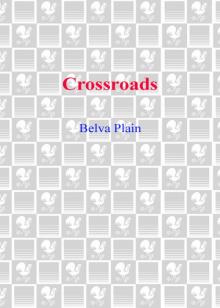 Crossroads
Crossroads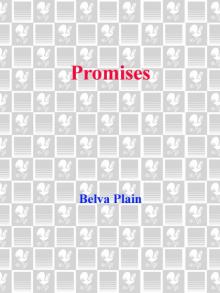 Promises
Promises After the Fire
After the Fire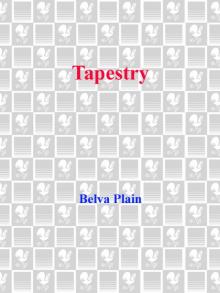 Tapestry
Tapestry Looking Back
Looking Back Heartwood
Heartwood The Carousel
The Carousel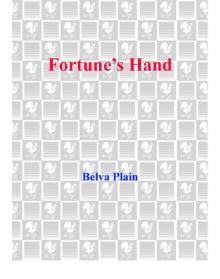 Fortune's Hand
Fortune's Hand Homecoming
Homecoming Random Winds
Random Winds Harvest
Harvest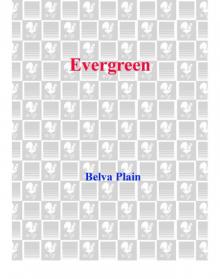 Evergreen
Evergreen Treasures
Treasures The Sight of the Stars
The Sight of the Stars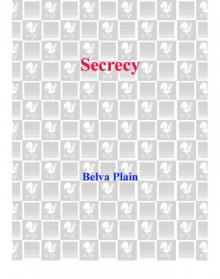 Secrecy
Secrecy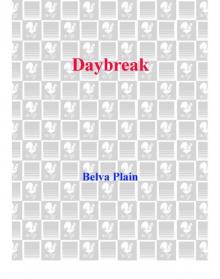 Daybreak
Daybreak Eden Burning
Eden Burning